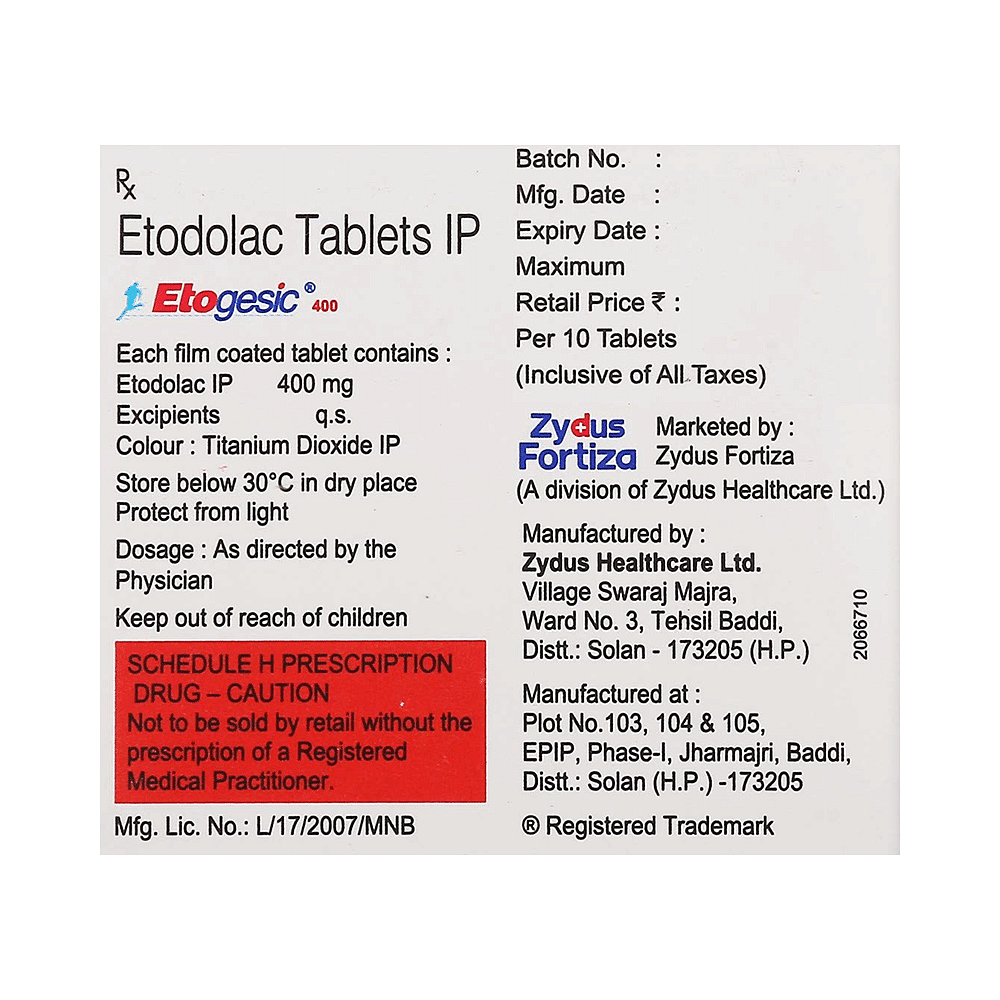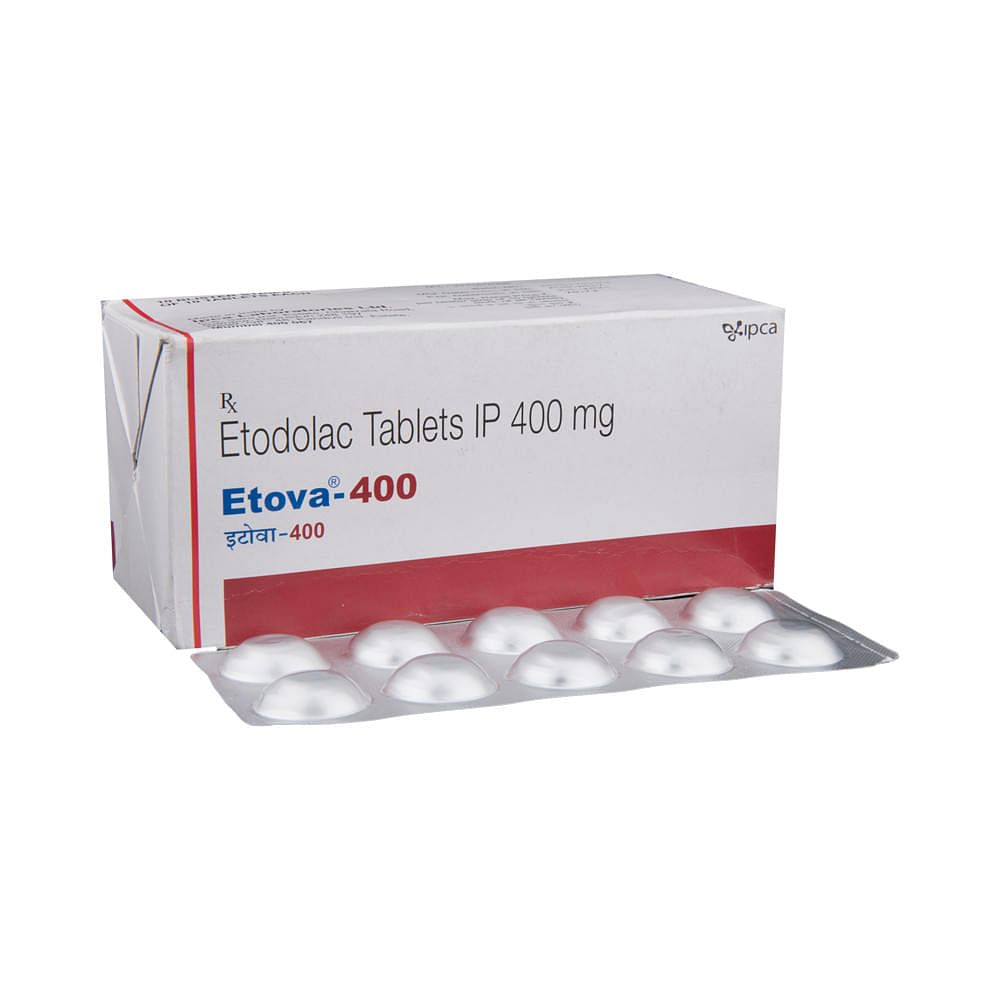
Vodolac 400 Tablet
Manufacturer
Superlative Healthcare
Salt Composition
Etodolac (400mg)
Key Information
Short Description
Vodolac 400 Tablet is a pain-relieving medicine that effectively alleviates pain and inflammation in conditions like rheumatoid arthritis, osteoarthritis, and acute pain.
Dosage Form
Tablet
Introduction
Vodolac 400 Tablet should be taken in the dose and duration as advised by your doctor. It should be taken with food or milk to prevent stomach upset. Inform your doctor if you have any history of heart disease or stroke. Vomiting, stomach pain, nausea, and indigestion are some of the common side effects that might be observed on taking this medicine. It may also cause dizziness, drowsiness, or visual disturbances. Your doctor may regularly monitor your kidney function, liver function, and levels of blood components if you are taking this medicine for long-term treatment. Long-term use may lead to serious complications such as stomach bleeding and kidney problems.
Directions for Use
Take this medicine in the dose and duration as advised by your doctor. Swallow it as a whole. Do not chew, crush or break it. Vodolac 400 Tablet is to be taken with food.
Safety Information
Side Effects
Vomiting stomach pain nausea indigestion dizziness drowsiness visual disturbances
Alcohol Warning
It is unsafe to consume alcohol with Vodolac 400 Tablet.
Breastfeeding Warning
Vodolac 400 Tablet is probably unsafe to use during breastfeeding. Limited human data suggests that the drug may pass into the breastmilk and harm the baby.
Pregnancy Warning
Vodolac 400 Tablet may be unsafe to use during pregnancy. Although there are limited studies in humans, animal studies have shown harmful effects on the developing baby. Your doctor will weigh the benefits and any potential risks before prescribing it to you. Please consult your doctor.
Interacting Medicines
Nimesulide Oxyphenbutazone Metamizole
How it works
Vodolac 400 Tablet is a non-steroidal anti-inflammatory drugs (NSAID). It works by blocking the release of certain chemical messengers that cause pain and inflammation (redness and swelling)
Quick Tips
Take it with food or milk to prevent upset stomach. Take it as per the dose and duration prescribed by your doctor. Long term use may lead to serious complications such as stomach bleeding and kidney problems. Use caution while driving or doing anything that requires concentration. Avoid consuming alcohol while taking Vodolac 400 Tablet as it can cause excessive drowsiness and increase your risk of stomach problems. Inform your doctor if you have a history of heart disease or stroke. Your doctor may regularly monitor your kidney function, liver function, and levels of blood components if you are taking this medicine for long-term treatment.
Related Medicines

Etogesic 400 Tablet

Etova 400 Tablet

Fytolac 400mg Tablet

Arthadol 400mg Tablet

Etodofine 400mg Tablet

Etorite 400mg Tablet

Etolife 400mg Tablet

Etoboon Tablet

Etopik 400mg Tablet

Epolis 400mg Tablet
Frequently asked questions
Is Vodolac 400 Tablet a narcotic?
No, Vodolac 400 Tablet is not a narcotic. It belongs to the non-steroidal anti-inflammatory drugs (NSAIDs) group of medicines.
Does Vodolac 400 Tablet get you high?
No, Vodolac 400 Tablet does not get you high. It does not have an abuse potential (drug-seeking behavior) and does not cause physical or psychological dependence. However, if you do not feel well, consult your doctor to discuss any concerns you may have.
Who should not use Vodolac 400 Tablet?
Use of Vodolac 400 Tablet should be avoided in patients who are allergic to Vodolac 400 Tablet or any of its components. If you are unsure about any allergies or are using Vodolac 400 Tablet for the first time, consult your doctor for personalized guidance.
Can Vodolac 400 Tablet hurt your kidneys?
Long-term use and high doses of Vodolac 400 Tablet may cause renal problems, such as protein or blood in urine and pain during urination. Patients with pre-existing conditions like heart failure, impaired kidney function, and hypertension are at a higher risk of kidney problems. Additionally, patients taking diuretics or medications that significantly impact kidney function may also be at risk. Patients over 65 years of age or those who are dehydrated may also experience kidney issues. Regular kidney function monitoring is recommended for these patients.
Does Vodolac 400 Tablet make you drowsy?
Vodolac 400 Tablet can cause drowsiness, dizziness, fatigue (tiredness), and visual disturbances, although these effects are not common and may not affect everyone. If you experience these symptoms, it is recommended that you avoid driving or operating heavy machinery.
Is Vodolac 400 Tablet effective?
Vodolac 400 Tablet is effective when used in the dose and duration advised by your doctor. It is essential to complete the full course of treatment as directed, even if you experience improvement in your condition. Stopping the medication too early may cause symptoms to return or worsen.


